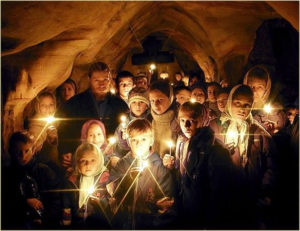A Case for Churches Standing Up, Not Locking Down
By Tim Cantrell, Antioch Bible Church, Sr. Pastor
Johannesburg, South Africa
July 2021
More waves and variants of Covid, more lockdowns, and more bans on churches – all of these beg for more biblical teaching and wise counsel for confused saints. Our country is in flames, and yet churches are shut down? When our nation most needs prayer, houses of prayer are bolted shut? As the darkness deepens and the light of Christ is most needed, church lampstands are snuffed out (Rev. 1:20)?! What happened to not hiding our light under a bushel (Matt. 5:14-16)?
One of our seminary faculty and a fellow pastor, David de Bruyn, back in January predicted well our current situation:
…The difficulty we are going to face in the coming months, and maybe even years, is that as wave after wave of the virus comes our way, the government may keep banning religious gatherings…. We cannot live through another year where we are tossed to and fro by every announcement coming from Pretoria. At least one thing needs to remain certain in our lives, and that is our covenant with Christ and His people. We need the rock-solid pillar of the church, the pillar and ground of the truth (1 Tim. 3:15), not the shifting sands of whatever happens with Covid-19.[i]
From a pastor’s heart, here are biblical answers to six burning questions so that we don’t disassemble what God has assembled (over a two-part series):
(1) Why meet ‘illegally’?
(2) Why no livestream, ‘on-line’ church?
(3) Should we meet publicly or not?
(4) Does it matter if lockdowns are persecuting/targeting Christians or not?
(5) By meeting, are we denying the reality & risk of Covid and minimizing all the pain & loss (and harming our Christian witness)?
(6) Should I get the vaccine? Or is it the ‘mark of the beast’?

- Why meet ‘illegally’?
Like our Lord, let’s answer that question with another question, from Christ Himself to Peter and to us all, “But who do you say that I am?” (Mk 8:29). Here’s a clear answer from the opening lines of Grace Community Church’s elders 2020 statement (in Sun Valley, California):
Christ is Lord of all. He is the one true head of the church (Eph.1:22; 5:23; Col. 1:18). He is also King of kings—sovereign over every earthly authority (1 Tim. 6:15; Rev. 17:14; 19:16). GCC has always stood immovably on those biblical principles. As His people, we are subject to His will and commands as revealed in Scripture. Therefore we cannot and will not acquiesce to a government-imposed moratorium on our weekly congregational worship or other regular corporate gatherings. Compliance would be disobedience to our Lord’s clear commands.[ii]
The Church cannot have two sovereigns. What does our Lord command as Head of His Church? From Mt. Sinai to Pentecost and the early church, God made it very clear that He requires His people to gather and worship Him at least once a week. (See: Exod. 20:1-11; Heb. 10:24-25; Acts 2:42-47). When our government contradicts this command by forbidding gathering, it is stepping out of its jurisdiction.
Thankfully, we live in a constitutional democracy here in South Africa. We still have the chance to prove in court that the temporary public health orders (or martial law, emergency regulations, etc.) are actually illegal according to our Constitution, and Christians who are practicing their religion are upholding the highest law of the land, which recognizes our basic human right to freedom of religion (see Section 15 in our Bill of Rights, and Section 31 in our Constitution). But whether gathering is legal or illegal, it is essential.
As Owen Strachan writes:
We need church. Embodied congregational worship of Christ is essential–in all seasons. Should we be wise, and thoughtful, and even careful? Yes we should. Wisdom is not the enemy of divine commands, however. We modern Christians may have many “options” regarding whether we go to church or not, but outside of serious health concerns (and even possibly including them on a case-by-case basis), we do not have the “option” of skipping congregational worship.
There have been times in history when churches have been unable to meet because of a plague. But to this day, there is still no scientific proof that the pandemic is driven by asymptomatic spread and super-spreader events.[iii] There is no evidence that church services cannot be held without effective safety measures. Love compels us to care for the whole person, body and soul; but the first duty of the Church is to rescue souls from the worst dangers of all, which are of eternal consequence – the world, the flesh, and the devil (1 Jn. 2:15-17; Eph. 2:1-3; 6:10-12, etc.). The job of the shepherd is to gather, not to scatter the sheep (Jer. 23; Jn. 10; Acts 20:18-35; 1 Pet. 5:1-4).
As the GCC elder’s statement goes on to say:
The church by definition is an assembly. …A non-assembling assembly is a contradiction in terms. Christians are therefore commanded not to forsake the practice of meeting together (Heb. 10:25)—and no earthly state has a right to restrict, delimit, or forbid the assembling of believers. We have always supported the underground church in nations where Christian congregational worship is deemed illegal by the state.
Christians should indeed be the best citizens of the state, true “salt” and “light” in the most dark and decaying cultures (Matt. 5:13-16). That means our default position is one of submitting to God by our civil obedience to government (Rom. 13:1-7; 1 Pet. 2:13-17). But when the state asks us to do what Scripture forbids, or forbids from doing what Scripture requires, we must “obey God rather than men” (Acts 5:29).
Covid lockdowns have converted modern Christians to the age-old lie of statism, with its slogan: ‘The State gives, the State takes away, blessed be the name of the State’ (contra Job 1:21). For more on this subject, and the correct use of Romans 13, see my essay here: https://www.gracechurch.org/cantrell/posts/2127 (“When to Disobey: A Theology of Resistance for Reluctant Protestants”).
Praise God for the brave examples of our brothers (and sisters) in Canada. May their tribe increase! Watch their story here; your church or mine could be next: https://www.jccf.ca/the-government-war-on-worship/.[iv]

- Why no livestream, ‘on-line church’?
Answer: Because there is no such thing, despite all of today’s digital delusions, ‘technopoly’, and Big Tech takeover. [v] It is an oxymoron (as stated above) to speak of a separated gathering, an isolated assembly. How about a virtual honeymoon for the newlyweds? That’s why our church cannot offer ‘virtual communion’; because in 1 Cor. 11, four times Paul states that the Lord’s Supper is a church ordinance for “when you come together”, not for private participation. And in 1 Thess. 2-3, Paul is emphatic about the need for “face to face” fellowship.[vi]
Biblical Christianity is incarnational; all else is false religion. We worship an incarnate Lord, the eternal Word who “became flesh and dwelt among us” (Jn 1:14). And so His means of grace to us are also incarnational and ‘enfleshed’, not pixelated. God has uniquely made His image-bearers to be body-and-soul creatures. As de Bruyn warns:
Screens have colonized us. And it appears that Christianity…has likewise been screenified. It is primarily a debate over what a fully human Christianity is. It is the Christian view of the body that is behind these debates. …does ‘virtual’ presence still constitute a true, human presence? …the images might be ‘live’, but they are not living. …worship is more than communication; it is the communion of living persons with one another.[vii]
Many of us as pastors/elders had to learn this lesson the hard way last year, seeing how on-line ministry (despite the best motives) becomes a dangerous crutch and convenient excuse. Saints form bad spiritual habits that are hard to break, depriving them of the love, care and accountability they need, and that their church family needs from them.
We have also seen the benefits of the flock not having the livestream option, bringing greater incentive and a warm invitation to return to in-person fellowship. What a joyful reunion it has been each time to welcome our dear brothers and sisters back! No wonder the New Testament puts such a high premium on affectionate Christian greetings (Rom. 16; 1 Cor. 16:19-20, etc.).

- Should we meet publicly or not?
I wish this were the bigger debate among Christians – not about if we should obey Christ, but where and how. Here is a genuine area of Christian freedom and godly wisdom in how we apply biblical principle, as summed up in Jesus’ command: “Behold, I send you out as sheep in the midst of wolves; so be shrewd as serpents and innocent as doves” (Matt. 10:16).
We must carefully weigh up many factors, such as: the legal recourse and avenues available (e.g., a constitutional democracy vs. a communist state); the visibility of a church’s location; the extent of police threat; the spiritual needs and maturity of a church flock at that time; the godly consensus of a church’s elders; number of people gathering; other available venues, and their location, capacity and ventilation, etc.
In God’s Word, there are times we are told to “flee to the mountains”, to avoid danger, to find safe refuge from physical harm (Mk. 13:14; Prov. 22:3; 27:12). But there are other times we are called to “stand”, to face the enemy head on, to lay down our lives (Mk. 8:34-38; Jn. 15:18-20; Acts 5:41; 1 Pet. 4:12-19; 2 Tim. 3:12; Heb. 10:32-34; 13:13; Rev. 12:11).
Rightly do we admire the open defiance of Daniel and his three friends against the self-worship and idolatry of Nebuchadnezzar, with Daniel deliberately praying by his open window (Dan. 3, 6). Yet the early church often hid in the Roman catacombs so that their meetings would not be interrupted, to preach the gospel, expound Scripture, practice the ordinances, bring comfort, love one another, and prepare Christ’s soldiers for persecution. Church history is also full of accounts of underground weddings and funerals amidst state persecution. This was one reason that churches owned their own graveyards for centuries.
In a country like South Africa, if more churches would unite together to stand up for our religious liberties and against government overreach, it would be impossible for the police to arrest all the worshippers or even disburse all the services. However, those committed to meeting are a tiny minority, so we have no such strength in numbers.
The Scottish Covenanters would meet secretly out in the moors and highlands. When these underground meetings were found out, Christians courageously faced their persecutors, like our Lord in Gethsemane when He prayed to be spared yet rose to meet His betrayer and the police (Mk. 12:43ff). Our Lord especially promises to give us wisdom for such decisions, and the words to speak as we bear witness for Him before our foes (Jm. 1:5-8; Matt. 10:16-20).
Join me next time as we tackle the three remaining questions.
[i] https://www.gracechurch.org/cantrell/posts/2127
[ii] https://www.gty.org/library/blog/B200723
[iii] https://www.pandata.org/are-asymptomatics-sick-until-proven-healthy/ https://jamanetwork.com/journals/jamanetworkopen/fullarticle/2774102 https://www.sciencemag.org/news/2020/02/paper-non-symptomatic-patient-transmitting-coronavirus-wrong ; https://www.ncbi.nlm.nih.gov/pmc/articles/PMC7219423/#
[iv] Another Canadian pastor warns: “Based upon the logic I’ve heard from other pastors over the past 15 months, if experts & elected officials declare Climate Change a global emergency, pastors will close their churches again.” https://twitter.com/DrAaronRock
[v] As Neil Postman warned way back in 1993, in his book, Technopoly: The Surrender of Culture to Technology: “The uncontrolled growth of technology destroys the vital sources of our humanity. It creates a culture without a moral foundation. It undermines certain mental processes and social relations that make human life worth living.”
[vi] See my sermon here: https://youtu.be/fzQ5Pf45Lsc (“Face to Face: Against Disembodied Christianity”)
[vii] See de Bruyn’s helpful three-part series here: https://religiousaffections.org/articles/articles-on-church/let-us-break-bread-together-on-our-screens/; https://religiousaffections.org/articles/articles-on-church/disembodied-christianity/; https://religiousaffections.org/articles/articles-on-church/live-images-are-not-living-persons/

